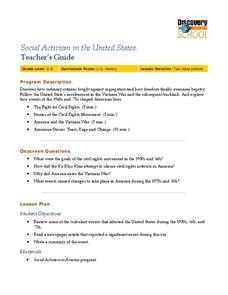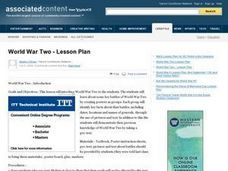Curated OER
Tension Over Slavery
Eighth graders research the events that lead to the US Civil War. They use the Jigsaw technique to report the findings of their research.
Curated OER
Recruitment
Fifth graders analyze and then draw recruitment posters. In this Revolutionary War instructional activity, 5th graders analyze recruitment posters and discuss the attitude towards African Americans. Students analyze primary documents...
Curated OER
Sojourner Truth
Students research Sojourner Truth. In this African-American history lesson, students read the speech "Ain't I A Woman?" and brainstorm descriptive words that describe Sojourner Truth. Students discuss why her acts were considered...
Curated OER
MANY REASONS TO LEAVE
Students research different economic, cultural, and social characteristics of slavery after 1800, how slavery hindered the emergence of capitalist institutions and values, and slavery both prior to and after the Civil War.
Curated OER
The Westward Movement
Learners study the westward movement through examining stamps. In this westward movement lesson plan, students draw conclusions, determine cause and effect relationships and examine the westward movement of the United States by...
Curated OER
Government Lesson Plan: Lesson Plan 9
Young scholars examine and compare/contrast the steps of criminal and civil cases. They define key vocabulary terms, develop an outline of a criminal and civil trial, and analyze the differences in standards of proof in legal cases.
Curated OER
Living on a Cotton Farm: Mexican Americans Life In Texas
Seventh graders are introduced to the processes of cotton farming in the early 20th century. In groups, they examine the role of Mexican Americans on the farms and the impact of a boom and bust economy on cotton. They identify the...
Curated OER
Reporting from the Front Lines
Students examine the battle of Gettysburg as they write news articles. In this Battle of Gettysburg lesson, students become familiar with the job of the news reporter as they report on the events of the Battle of Gettysburg as they write...
Albert Shanker Institute
Economic Causes of the March on Washington
Money can't buy happiness, but it can put food on the table and pay the bills. The first of a five-lesson unit teaches pupils about the unemployment rate in 1963 and its relationship with the March on Washington. They learn how to create...
Curated OER
Children at War
Students conduct Internet research to investigate the use of children in combat throughout the world. Students read personal testimonies and analyze media coverage of children in combat.
Curated OER
Westward Expansion Unit
Eighth graders investigate the importance of Westward Expansion in the history of the United States in this unit of lessons.
Curated OER
Social Activism in the United States
Seventh graders explore the goals of the Civil Rights Movement of the 1950s and 1960s. In this US History lesson plan, 7th graders read a newspaper article that reported a significant event during this era. Students write a summary of...
Curated OER
Eisenhower: The Contentious 1950s
Students explore 1950's America. In this American history lesson, students research the McCarthy hearings, Civil Rights, war fatigue, and economic issues of the decades. Students respond to discussion questions about topics.
Curated OER
Checks and Balances: Japanese-American Incarceration
Middle schoolers examine the three branches of the Federal Government and their decision to place Japanese-Americans in camps during World War II. They analyze debates made by leaders during this time period.
Curated OER
Sojourner Truth, African American Woman of the 19th Century
Pupils examine Sojourner Truth's philanthropist acts during her life. They discover that everyone has the right to be heard by their government. They compare and contrast the woman's movement and the anti-slavery movement.
National Endowment for the Humanities
Revolution '67, Lesson 1: Protest: Why and How
To some people, protesting is as American as apple pie, but the factors that lead to protests can be as confusing to veteran activists as to today's youth. Revolution '67 explores the riots in Newark, New Jersey as a case study. Using...
University of California
Anti-Communism at Home
Have you ever been accused of something without cause? The sixth installment of an eight-part series asks scholars to create a museum exhibit on the anti-communist activities in the United States at the start of the Cold War. To make...
Curated OER
Social Changes in America Caused by World War II
Young scholars research and examine the social changes that occured in the United States during World War II. In pairs they conduct research using a variety of resources, and organize and compose a "Guide to Life" for veterans returning...
Curated OER
World War II
Students create a Powerpoint presentation covering key information regarding a World War II battle and present the information to the class in the form of an oral presentation. They then will turn in a summary report including two...
Curated OER
Denying Civil Rights
Students continue their examination of the United States Constitution. Individually, they identify events in which the government has limited our civil rights and write an essay. In groups, they debate the issue and answer...
Curated OER
The Civil War
Eleventh graders study selected prints and/or photos and consider how Americans of the 19th century chose to present themselves to other Americans and the world by means of visual images. They share their observations and opinions.
Curated OER
Morgan's Raid in Ohio
Pupils examine the cause, effect, and impact of Morgan's Ohio raid during the Civil War. They complete unit sections on the raid, dates, viewpoints, results, and historic markers.
Curated OER
The Kansas-Nebraska Act of 1854: Popular Sovereignty and the Political Polarization over Slavery
Why did Stephen Douglas support the Kansas-Nebraska Act of 1854? Why did Abraham Lincoln oppose it? Young historians examine how the Kansas-Nebraska Act of 1854 affected the political balance between free and slave states and explore how...
Curated OER
Road to Revolution
Learners discuss reasons war erupted between Britain and the colonies. They examine and explain critical events of the 1760s, and discuss what rights and beliefs Americans felt were being violated.

























